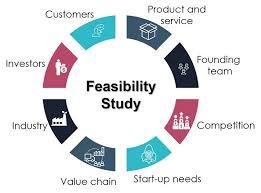Technical Feasibility: The First Step to Blockchain Success

The Blockchain Dream Meets Reality Check
Every visionary has an idea. Decentralized finance. Secure digital identity. Transparent supply chains. But between a whiteboard sketch and a functioning dApp lies a complex world of code, protocols, platforms, and practical constraints.
This is where a Technical Feasibility Study separates wishful thinking from what’s actually possible, given your resources, timeframe, and existing tech stack.
A Developer’s Dilemma: Is Your Stack Blockchain-Ready?
Let’s say your dev team is fluent in JavaScript, but your blockchain solution hinges on Solidity or Rust. Suddenly, that learning curve looks like Mount Everest. A technical feasibility analysis doesn't just identify potential it flags gaps in skills, tooling, and infrastructure.
In essence, it answers: Can your current environment support blockchain development or will it break under the weight?
Choosing the Right Blockchain Isn’t Plug-and-Play
Public vs private chains. Ethereum vs Hyperledger. Proof of Work vs Proof of Stake. The blockchain ecosystem is a maze, not a monolith. The wrong foundational choice could sink your project before it even sets sail.
A feasibility study helps you align your use case with the most appropriate blockchain architecture. It’s your compass in a landscape full of forks, layers, and trade-offs.
Scalability and Speed: Two Sides of the Blockchain Coin
You’ve built a sleek MVP, but when real users hit the platform, transactions crawl, and costs spike. Sound familiar? Without testing throughput under load, your blockchain could bottleneck at scale.
Feasibility isn’t just about building it’s about building for scale. A Technical Feasibility Study will simulate high usage and identify where cracks may form in performance or latency.
Smart Contracts: Powerful, but Prone to Pitfalls
Smart contracts execute logic immutably and that’s both a blessing and a curse. A single bug could lock funds forever. Feasibility analysis includes code audits, risk assessments, and sandbox testing before you ever hit “deploy.”
Think of it as QA with the stakes multiplied because on the blockchain, there’s no “undo” button.
Security Isn’t Optional. It’s Built-In or It Isn’t
Blockchains are secure by design, but apps built on them? Not always. From reentrancy attacks to flash loan exploits, the list of vulnerabilities grows as fast as the industry.
That’s why a Technical Feasibility Study must include a security blueprint reviewing how your project will resist intrusion, data breaches, and malicious actors from day one.
Integration Matters: Blockchain Doesn’t Live in Isolation
No product is an island. Your blockchain app likely connects with APIs, databases, CRMs, or legacy systems. Are these components compatible? Can they speak to each other securely and in real time?
Technical feasibility digs deep into integration points because even the sleekest blockchain UI fails if the backend falls apart.
Cost Estimations: Avoiding the Budget Black Hole
Let’s be real blockchain isn’t cheap. From development time to node hosting, gas fees to audit costs, it adds up. A feasibility study provides a realistic snapshot of what it’ll take financially to go from idea to MVP to production.
It’s not just about whether you can build it’s whether you can afford to.
Regulatory Readiness: Not Just a Legal Issue, but a Technical One
Is your dApp GDPR compliant? Can it handle KYC/AML protocols? Can you “forget” user data in an immutable environment?
Regulatory feasibility is deeply entwined with technical feasibility. Skipping this step risks non-compliance and trust us, no amount of decentralization will save you from fines.
Team Skillsets: Are You Built for Blockchain?
A Technical Feasibility Study evaluates your team’s readiness. Do you need a Solidity expert, a DevOps engineer, or someone fluent in IPFS? Knowing what talent gaps exist early means avoiding emergency hires later.
Proof of Concept: The Feasibility Study in Action
Often, a PoC emerges from a good feasibility study. This stripped-down version proves that core functionality is not just theoretical—it works. It’s how you build stakeholder trust, investor confidence, and internal momentum.
FAQs
What is a Technical Feasibility Study in blockchain?
It’s an in-depth analysis that determines whether a blockchain project is technically possible within the given constraints of time, budget, skills, and infrastructure.
Why do I need a feasibility study before building a blockchain product?
It helps avoid costly mistakes by identifying technical risks, compatibility issues, scalability limits, and budgetary shortfalls before development begins.
Does a feasibility study include a security assessment?
Yes. Security is a critical component, especially with smart contracts. The study includes auditing methods, vulnerability analysis, and risk mitigation strategies.
How long does a blockchain feasibility study take?
Timelines vary, but a well-conducted feasibility study can take anywhere from a few weeks to a couple of months, depending on the project’s complexity.
Is a Proof of Concept part of the feasibility process?
Often, yes. A POC validates the core technology in a live or simulated environment, serving as a tangible output of the feasibility phase.
Can a feasibility study prevent project failure?
While it doesn’t guarantee success, it dramatically reduces risks by ensuring that your project is technically sound, realistic, and strategically planned.
Conclusion:
Innovation without validation is chaos. Blockchain promises disruption—but only if it’s grounded in reality. A Technical Feasibility Study isn't a formality it's a framework. It shapes your architecture, aligns your vision with reality, and shields your investment from the unknown.
In a tech world that moves fast and breaks things, feasibility is your pause button—so you build not just quickly, but wisely.
- Vibnix Blog
- Politics
- News
- Liberia News
- Entertainment
- Technology
- Education
- Art
- Causes
- Crafts
- Dance
- Drinks
- Film
- Fitness
- Food
- Games
- Gardening
- Health
- Home
- Literature
- Music
- Networking
- Other
- Party
- Religion
- Shopping
- Sports
- Theater
- Wellness


